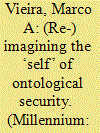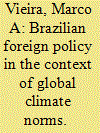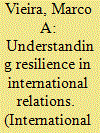| Srl | Item |
| 1 |
ID:
157592


|
|
|
|
|
| Summary/Abstract |
In this article, I critically engage with and develop an alternative approach to ontological security informed by Jacques Lacan’s theory of the subject. I argue that ontological security relates to a lack; that is, the always frustrated desire to provide meaningful discursive interpretations to one’s self. This lack is generative of anxiety which functions as the subject’s affective and necessary drive to a continuous, albeit elusive, pursuit of self-coherence. I theorise subjectivity in Lacanian terms as fantasised discursive articulations of the Self in relation to an idealised mirror-image other. The focus on postcolonial states’ subjectivity allows for the examination of the anxiety-driven lack generated by the ever-present desire to emulate but also resist the Western other. I propose, therefore, to explore the theoretical assertion that postcolonial ontological security refers to the institutionalisation and discursive articulation of enduring and anxiety-driven affective traces related to these states’ colonial pasts that are still active and influence current foreign policy practices. I illustrate the force of this interpretation of ontological security by focusing on Brazil as an example of a postcolonial state coping with the lack caused by its ambivalent/hybrid self-identity.
|
|
|
|
|
|
|
|
|
|
|
|
|
|
|
|
| 2 |
ID:
124605


|
|
|
|
|
| Publication |
2013.
|
| Summary/Abstract |
This article is an enquiry into Brazil's evolving responses to global climate change norms. Following an overview of the evolution of international normative frameworks of climate change governance, I examine the relationship between some of these international norms and domestic environmental politics in Brazil. Internationally, the analysis focuses on the North/South political debate about climate change and its role in shaping understandings about the impact and responses to global warming. Domestically, I explore the evolving relationship between state and private actors in the decision-making process. I argue that Brazil's official position on climate change negotiations is currently influenced by a nationalist/developmental approach based on the particular worldview of the dominant faction within the foreign ministry and backed up by private groups, powerful sectors in the military establishment, key ministries, and the presidency. Yet, this worldview has been increasingly undermined/permeated by other state and nonstate actors, who are more closely aligned with the environmental concerns of international stakeholders. The ensuing domestic conflict has important implications for the legitimacy and coherence of the Brazilian position in international climate change negotiations
|
|
|
|
|
|
|
|
|
|
|
|
|
|
|
|
| 3 |
ID:
146242


|
|
|
|
|
| Summary/Abstract |
Born more than half a century ago, the Non-Aligned Movement (NAM) embodied the collective identity and aspirations of newly independent nations in Africa and Asia. Since the end of the Cold War, NAM’s relevance has been brought into question given the passing of the geopolitical context that motivated its creation. More recently, in the wake of the NAM’s Tehran meeting in August 2012, myriad analyses have yet again questioned NAM’s political effectiveness and legitimacy as an ideologically coherent vehicle for developing countries’ definition of common positions on a host of global issues. Drawing from the literature on ontological security, I argue that NAM’s enduring relevance, legitimacy, and institutional resilience are the result of some of its key member states’ adherence to the core principles of nonalignment. Notwithstanding the profound changes in both the international system and in the political and socioeconomic contexts of most of NAM’s members since the movement’s creation, these principles have fundamentally shaped their postcolonial identities in international relations. I claim that NAM’s contemporary resilience derives from the stabilizing sense of continuity that the movement provides by reifying developing states’ shared identity in an increasingly de-centered and uncertain global order.
|
|
|
|
|
|
|
|
|
|
|
|
|
|
|
|